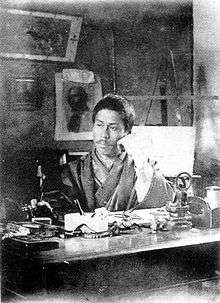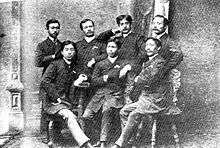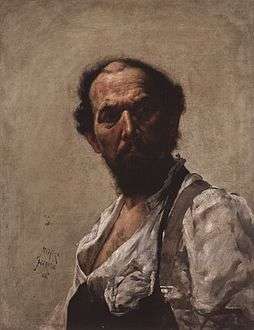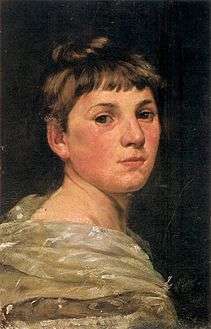Harada Naojirō
| Harada Naojirō | |
|---|---|
 Harada Naojirō, c. 1885 | |
| Native name | 原田 直次郎 |
| Born |
12 October 1863 Edo, Japan |
| Died | 26 December 1899 (aged 36) |
| Nationality | Japanese |
| Movement | Yōga |
Harada Naojirō (原田 直次郎; 12 October 1863 – 26 December 1899) was a Japanese Western-style painter. He was a friend of the novelist Mori Ōgai and served as the model for the protagonist in Ōgai's short story "A Sad Tale" (1890).

Life and career
Harada Naojirō was born in the Koishikawa area of Edo (modern Tokyo) on 12 October 1863.[lower-alpha 1] He was the second son of Ai and Ichidō. Ichidō worked for the military government at the Bansho Shirabesho, where foreign books were studied and translated. He wanted his son to learn French, and to this end had Naojirō enrolled at the Osaka Kaisei School in 1870 and at the Tokyo School of Foreign Languages in 1873, from where he gradutated in 1881. That August he married Ōkubo Sada.[lower-alpha 2]
From the age of eleven Harada began studying yōga Western-style painting under Yamazaki Nariaki, and from 20 under Takahashi Yuichi, who at the time was the most prominent yōga painter in Japan. Harada moved to Germany in 1884, where he audited classes at the Academy of Fine Arts in Munich he apprenticed under the Austrian painter Gabriel von Max, a friend of his brother Toyokichi's. While in Munich he befriended the German painter Julius Exter and the Japanese writer Mori Ōgai, who had been dispatched to Germany by the Ministry of War of Japan. In 1886 he began to live with a woman named Marie who worked in a café on the ground floor of the building he lodged in. Around that October he guided Viscount Hamao Arata around, who was on a government tour of inspection abroad. On 22 November he left a pregnant Marie and toured Switzerland, Venice, and Rome, meeting Japanese painters there, and audited classes at the École des Beaux-Arts in Paris. He left France in May the next year.
- Paintings by Harada Naojirō
 Shoemaker, 1886
Shoemaker, 1886.jpg) Kannon Riding a Dragon, 1890
Kannon Riding a Dragon, 1890 Girl
Girl_Portr%C3%A4t_eines_Japaners.jpg) Portrait of a Japanese, portrait of Harada by Julius Exter
Portrait of a Japanese, portrait of Harada by Julius Exter
Notes
- ↑ The 30th day of the 8th month of the year of Bunkyū by the Japanese calendar
- ↑ 大久保さだ